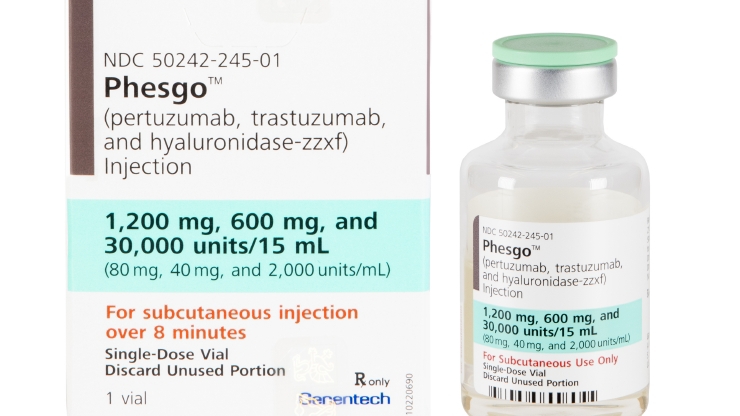Keytruda (pembrolizumab) vs Phesgo (pertuzumab, trastuzumab, and hyaluronidase)
Keytruda (pembrolizumab) vs Phesgo (pertuzumab, trastuzumab, and hyaluronidase)
Keytruda (pembrolizumab) is an immune checkpoint inhibitor used primarily to treat various types of cancer by enhancing the body's immune response against cancer cells. Phesgo, on the other hand, combines two monoclonal antibodies, pertuzumab and trastuzumab, with the enzyme hyaluronidase and is specifically designed for the treatment of HER2-positive breast cancer, where it targets cancer cells expressing the HER2 protein. The choice between Keytruda and Phesgo would depend on the specific type of cancer a patient has; Keytruda is used for a broader range of cancers, including melanoma and non-small cell lung cancer, while Phesgo is tailored for HER2-positive breast cancer patients.
Difference between Keytruda and Phesgo
| Metric | Keytruda (pembrolizumab) | Phesgo (pertuzumab, trastuzumab, and hyaluronidase) |
|---|---|---|
| Generic name | Pembrolizumab | Pertuzumab, Trastuzumab, and Hyaluronidase-zzxf |
| Indications | Various types of cancers including melanoma, lung cancer, head and neck cancer, cervical cancer, and others | Breast cancer, specifically for use in patients with HER2-positive breast cancer |
| Mechanism of action | Programmed death receptor-1 (PD-1) blocking antibody | Combination of HER2/neu receptor antagonist and recombinant human hyaluronidase |
| Brand names | Keytruda | Phesgo |
| Administrative route | Injection (IV) | Injection (subcutaneous) |
| Side effects | Fatigue, musculoskeletal pain, decreased appetite, pruritus, diarrhea, nausea, rash, pyrexia, cough, dyspnea, constipation, pain in extremity, and headache | Diarrhea, nausea, alopecia, fatigue, vomiting, constipation, decreased appetite, rash, peripheral neuropathy, and anemia |
| Contraindications | Patients with severe hypersensitivity to pembrolizumab or any of its excipients | Patients with hypersensitivity to pertuzumab, trastuzumab, hyaluronidase, or any of their excipients |
| Drug class | Anti-PD-1 monoclonal antibody | Monoclonal antibodies and enzyme combination |
| Manufacturer | Merck & Co. | Genentech, Inc. |
Efficacy
Efficacy of Keytruda (Pembrolizumab) in Breast Cancer
Keytruda, known generically as pembrolizumab, is an immunotherapy drug that has shown efficacy in the treatment of certain types of breast cancer. It is a programmed death receptor-1 (PD-1) blocking antibody that helps the immune system to detect and fight cancer cells. Keytruda is particularly effective in treating triple-negative breast cancer (TNBC), which is a type of cancer that lacks the three most common types of receptors known to fuel most breast cancer growth—estrogen, progesterone, and the HER-2 gene. For patients with PD-L1 positive TNBC, Keytruda in combination with chemotherapy has been shown to improve survival rates and reduce the risk of disease progression.
In clinical trials, Keytruda has demonstrated a significant improvement in progression-free survival (PFS) when used as a first-line treatment in combination with chemotherapy for patients with metastatic TNBC that expresses PD-L1. The KEYNOTE-355 trial, which evaluated the efficacy of Keytruda, showed a median PFS of 9.7 months for the pembrolizumab-chemotherapy combination compared to 5.6 months for the placebo-chemotherapy combination. This indicates a substantial benefit for patients with this aggressive form of breast cancer.
Efficacy of Phesgo (Pertuzumab, Trastuzumab, and Hyaluronidase) in Breast Cancer
Phesgo is a combination of two monoclonal antibodies, pertuzumab and trastuzumab, with the enzyme hyaluronidase, and is used in the treatment of HER2-positive breast cancer. HER2-positive breast cancer is characterized by an overexpression of the human epidermal growth factor receptor 2 (HER2), which promotes the growth of cancer cells. By targeting the HER2 protein, Phesgo has been shown to effectively slow down the progression of the disease and to improve survival rates in patients with early and metastatic HER2-positive breast cancer.
In clinical studies, such as the FeDeriCa trial, Phesgo has been proven to be non-inferior to intravenous administrations of pertuzumab and trastuzumab, with respect to the pharmacokinetics and efficacy, while offering the convenience of subcutaneous injection. The combination of pertuzumab and trastuzumab has been a standard treatment for HER2-positive breast cancer, and Phesgo maintains this efficacy with a more patient-friendly administration route. The addition of hyaluronidase allows the drugs to be effectively absorbed after being injected under the skin, simplifying the treatment regimen for patients and potentially reducing the time spent receiving treatment.
Regulatory Agency Approvals
Keytruda
-
European Medical Agency (EMA), European Union

-
Food and Drug Administration (FDA), USA

-
Health Canada

-
Therapeutic Goods Administration (TGA), Australia

-
Medsafe (NZ)

Phesgo
-
European Medical Agency (EMA), European Union

-
Food and Drug Administration (FDA), USA

Access Keytruda or Phesgo today
If Keytruda or Phesgo are not approved or available in your country (e.g. due to supply issues), you can access them via Everyone.org.
How it works

Make an enquiry
Choose the medicine you want to buy, answer a couple of questions, and upload your prescription to speed things up. We’ll get back to you within 24 hours.


Make an enquiry
Choose the medicine you want to buy, answer a couple of questions, and upload your prescription to speed things up. We’ll get back to you within 24 hours.


Breeze through the paperwork
We'll guide you through the required documents for importing unapproved medicine, ensuring you have all the necessary information.


Get a personalized quote
We’ll prepare a quote for you, including medicine costs and any shipping, administrative, or import fees that may apply.


Receive your medicine
Accept the quote and we’ll handle the rest - sourcing and safely delivering your medicine.

Some text on this page has been automatically generated. Speak to your physician before you start a new treatment or medication.
Let's talk
If you have any questions, call us or send us a message through WhatsApp or email:
Contact us




